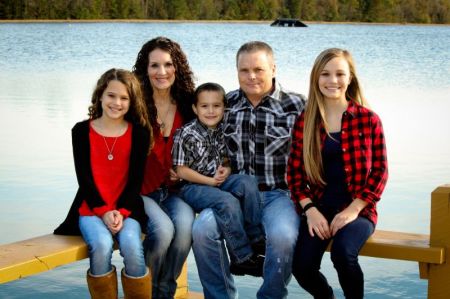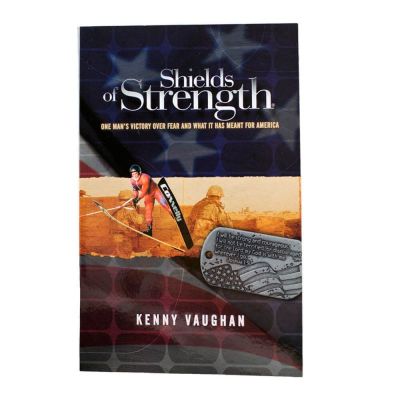Athlete's Inspirational 'Shields of Strength' Bible Verse Dog Tags Worn by Soldiers on the Battlefield

As a reminder of how to successfully manage life's many fears, former professional water skier-turned-author and motivational speaker Kenny Vaughan conceived of a simple idea that has turned into an inspirational phenomenon within the U.S. armed forces and beyond.
In his book Shields of Strength: One Man's Victory Over Fear and What it Has Meant for America, Vaughan gets personal about overcoming fear, and how doing so has led to an unexpected idea that's helping millions within the military, as well as people all across the nation, to walk in faith, and not fear.
Very few individuals face life-or-death situations on a daily basis like those who serve in the military. Many of these men and women protect America and carry out dangerous missions in war zones all while saving the lives of others without concern for their own preservation.
But, naturally, the fear of death creeps in.

While Vaughan doesn't equate the fears faced by average civillians with those faced by soldiers in armed conflcits, he does know his fair share about fear.
"Fear in itself I don't think is so bad. It's [how] we act on fear that becomes a problem," Vaughan told The Christian Post on Wednesday. "Love is a choice that results in a feeling, but fear is a feeling that can result in a choice."
"A lot of times we don't even control whether or not we feel fear. ... Most of the time I would say we don't. But how we act on that feeling is what determines whether or not fear rules our life," he said. "Neither fear nor love rules my life when I feel it. It's [how] I act on it."
"There are plenty of good fears ... you can have a feeling of fear, and then make an observation and make a different decision that can be really be good for you. So I never ignore fear, but I do my best to, as quickly as possible, assess it: 'What am I afraid of?' And then act on God's Word."
Vaughan, a former professional water skier who won a national title in 1996, often grappled with fear en route to his gold medal victory. He once handled that fear in a way that had ruled his life as an athlete.
Throughout his career the skier suffered years of losses and physical injuries and setbacks that shattered his confidence and made victory seem elusive.
Vaughan wrote in his book, "Instead of hoping my dream would come true, I was just hoping I would not fail again," worsening his fears so much so that when he had finally won a regional title, the victory felt empty.
"I lived the triumph, not as a victory, but as an extension of the fear that had flooded my spirit," he wrote. "Winning, when I was full of fear, was empty and more frightening, I think, than losing."
"It was great to have the trophy, but my confidence had slipped away so much that part of me could hardly believe that I had actually won. Fear just works that way. It robs you of the joy of victory."
The water skier's fear had such a stronghold on his mind that he began to believe that he didn't have "the heart of a champion."
So how did Vaughan bring his fears under subjection? "Gradually, I was beginning to understand that I needed more than physical training to win. The battle I was losing was spiritual."
Vaughan's longtime girlfriend, Tammie, had often encouraged him and nurtured his faith in Christ, he said, providing a living example of His love. Seeking "what she had," Vaughan consulted his uncle, who was a pastor, and learned more about the Bible and Christ. That night he gave his heart to the Lord.
It wasn't until Vaughan experienced a special encounter with Christ, however, that his heart was changed. He said in his heart he heard, "'You're not incapable. You're a son of the King of Kings. My Word says if you ask and believe you've received, then go out and act on what you've been given. Quit looking back over your shoulder to see if I'm with you. Change the way you pray from asking to thanking.'"
"Right then, right there, the fear that had dominated me left. It was just no longer there. God had reached into my soul and torn that torturing enemy right out of me. It was a miracle."
During the national competition, Vaughan focused on doing his best for Jesus and not worrying about winning, knowing that if he did so, God would not be disappointed in him. He went on to win the national competition.
Vaughan said God has already overcome fear for believers if they would act on His Word. "When I made a decision to act on God's Word spiritually, I picked up the shield of faith and the sword of the spirit, which enabled me to function with a sound mind."
He applied this Bible principle to everyday life and, as a daily reminder of God's Word, Vaughan bought and wore military-like dog tags engraved with Scriptures that he wanted to remember.
"I wore them under my shirt as daily reminders for me."
Other people noticed the dog tags and inquired about them. Soon Vaughan's little brother, Gabe, began to call the necklaces Shields of Strength, which — on nearly every necklace — is an inscription with the prayer of salvation.
Emails requesting the shields poured in, many requesting large quantities. In 2001, Vaughan received a request from the 86th Signal Battalion out of Fort Huachuca, Arizona, commanded by then Lieutenant Colonel David Dodd who was an avid Christian.
The 86th Signal Battalion were the first soldiers deployed to Afghanistan following the September 11 attacks and Dodd wanted his soldiers to have something to help them maintain their spiritual focus. The Battalion requested 500 shields ahead of their November deployment.
"I can't tell you how moved I was," Vaughan wrote.
The requests did not slow down. In the months ahead, Vaughan started hearing from soldiers, and how they would recite Scriptures engraved on the shields before they went into battle, or how they clasped the shields while on their posts.
"It was obvious that these little Shields of Strength, symbols of my own battle with paralyzing fear, were bringing encouragement and faith to our troops in the midst of their fierce battle."
After receiving an invitation from Col. Dodd to attend the 86th Signal Battalion Christmas ball, Dodd presented Vaughan with the colors of the 86th Battalion, their flag, and made him an honorary soldier.
That night, Vaughan was approached by a soldier who carried the shield and wanted to learn more about his story. "His question got me thinking about how to affect people like him with my story, and so I sat down to write him a letter. That letter became the seed of this book."
Without having gotten the young soldier's name or address, Vaughan passed the letter on to Col. Dodd. In the letter he wrote:
"'I pray my story encourages you to find the same freedom and that in turn, your story encourages someone else to do the same. And if we never meet again on this Earth, you can tell me your story as we walk together ... along the streets of gold.'"
To date, 4 million Shields of Strength have been given away or sold.
To learn more, visit shieldsofstrength.com.





















